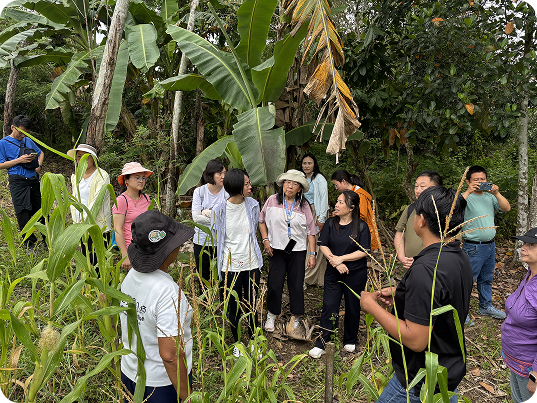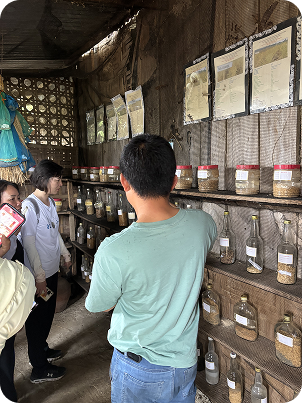Sultan Kudarat/Cotabato, Philippines. In a bid to enhance agricultural biodiversity and sustainable farming practices, the Farmers Seed Network (FSN) and Southeast Asia Regional Initiatives for Community Empowerment (SEARICE), through the Securing the Ecosystem by Enhancing Diversity and Sustainability (SEEDS) project, had facilitated a groundbreaking learning exchange on 3-5 April 2025 in the Philippines.
The exchange program brought eleven Chinese participants to farming communities in North Cotabato and Sultan Kudarat to explore innovations in seed conservation, organic agriculture, and policy advocacy. They participated in group discussions on seed production, preservation, and marketing while visiting trial farms, community seed banks, and an organic fertilizer site.
A focal point of the exchange was the stories shared by Filipino farmers involved in rice and corn breeding. One of them is Eduardo Edullantes, Sr., a farmer-breeder and chairman of the Kamarahan Rice and Vegetable Farmers Association in President Roxas, North Cotabato. Despite no formal training, Edullantes developed two climate-resilient rice varieties – EE1 and Wado 3 – through skills honed in SEARICE’s 2000 Farmer Field School on Participatory Plant Breeding. These organic varieties yield comparably to commercial seeds while offering superior aroma and taste, fetching ₱65 per kilo or 30-35% higher compared to the prevailing price of rice sold in the market.
“We’ve stopped relying on external seeds and chemicals,” said Edullantes, whose association mandates organic practices. “Our seeds thrive in changing weather, reduce costs, and preserve our land.”
The delegates also observed the regenerative agriculture practices implemented by Rey Nitura, President of the Kidapawan Organic Farmers Association, on his 3-hectare farm in the suburbs of Kidapawan City. Once an abandoned grassland, the land has been transformed into a thriving organic farm under Nitura’s care. Over three years, he has cultivated a diverse landscape of fruit trees, vegetable gardens, and rice plots.
“Converting idle land into productive farmland is incredibly difficult and costly, especially when following organic methods,” Nitura shared. “But after three years of perseverance, the hardships fade as the rewards begin to show.”
Nitura actively engages in seed breeding and exchanges varieties with fellow farmers to test their adaptability on his farm. His current focus is on identifying drought-resistant rice varieties, addressing the common challenges of limited irrigation and dry spells faced by local farmers.
In Arakan, North Cotabato, the delegation witnessed the tangible impact of SEARICE’s collaboration with local governments. In 2023, the municipality enacted a groundbreaking Sustainable Agriculture Code, drafted by farmers and facilitated by SEARICE to safeguard natural resources and promote food security. Key provisions include a ban on GMOs, free farmer access to seeds, institutionalized community seed banks, legal protections for farmer-bred varieties, and incentives for traditional crop breeding.
Municipal Agriculturist James Dulay also toured the group in the 4-hectare Arakan Integrated Nature Farm, a model site employing JADAM ultra-low-cost organic methods. Over 300 traditional upland rice varieties are conserved here, alongside a seed bank preserving genetic diversity.
“This farm was established in accordance with the code and has emerged as an educational hub for local governments, civil society organizations, and private practitioners seeking to study and replicate Arakan’s sustainable agricultural practices”, said Dulay.
The Chinese delegation expressed heartfelt gratitude to SEARICE and Filipino farmers for the invaluable insights gained during the exchange program, particularly regarding the farmers’ innovations in developing their own rice varieties and SEARICE’s effective collaboration with local governments to advance farmers’ rights to seeds.
FSN’s Ms. Song Xhin highlighted the significance of the exchange, noting that smallholder farmers in both the Philippines and China face similar challenges regarding genetic biodiversity and food systems. She said that the exchange not only strengthened Philippine-China agricultural ties but also reaffirmed the power of farmer-led innovation in preserving biodiversity.
“These exchanges are vital for cross-pollinating ideas,” said Normita Ignacio. “When farmers lead the conversation, we build systems that truly serve communities and ecosystems.”
The Learning Exchange Program is part of SEARICE’s Securing the Ecosystem by Enhancing Diversity and Sustainability (SEEDS) project, funded by EarthCare Foundation. SEEDS aims to bolster on-farm genetic diversity, empower smallholders in seed management, and advance policies supporting farmers’ rights.


